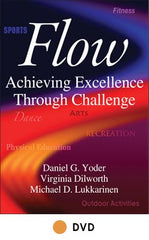Flow helps you set the stage for getting in the zone
This is an excerpt from Flow by Daniel Yoder,Virginia Dilworth & Michael Lukkarinen.
In this booklet and accompanying video, we consider this partly explored and not fully understood phenomenon. Following are the topics discussed:
Components and Indicators of Optimal Experiences
- Introduction of flow
- Balance between challenge and skill
- Concentration and distraction
- Goals and feedback
- Symptoms of flow (loss of self-consciousness; time disruption)
Application of the Theory of Flow
- Applying flow to recreation activities
- Applying flow to outdoor and adventure recreation
- Applying flow to sport and coaching
- Applying flow to the arts
- Applying flow to the workplace
While it is important to understand the theory of being in flow, it is also necessary to consider the practicalities of this powerful phenomenon. For example, literature on being in the zone stresses that distractions should be minimized if we are to give flow the best chance to occur. This booklet and the video go beyond that statement and advise you on how to minimize distractions. For example, a fitness instructor shares techniques that she uses to get participants in the zone in her classes. Her classes are more than merely putting on music and showing participants various moves. Instead, she tries to create a setting in which participants are encouraged to push themselves to go beyond what they believe they can do in this particular session. The goals are clear and the feedback is immediate. Participants are assured that they do not need to worry about how they look as they are working out. No one is going to criticize them.
This material is designed by, with, and for people who have had optimal experiences and know that their lives are enriched because of these rare and wonderful moments. We encourage you to make this material your own. By that, we mean you should make every effort to apply this material to your own life and to the lives of those with whom you interact. You might be in a formal position as a leader of recreation activities, and this material has direct and immediate application opportunities. Even if you're not a leader, you might have serendipitous opportunities to set the stage for getting in flow or in the zone for those near you. And even if you never have the occasion to encourage optimal experiences for anyone else, you can benefit from understanding these moments and use them to your greatest advantage.
In the effort to bring the theory of flow into people's lives, several learning activities are incorporated throughout the written and visual materials. These hands-on activities (some of which take place in the classroom and some of which take place outside of the classroom) will allow you to do the following:
- Recall and analyze your own optimal experiences
- Demonstrate the widespread nature of optimal experiences
- Demonstrate the relationship of flow to other life events
- Show the potential to enhance your quality of life in various settings
Finally, the video and accompanying booklet end with comments about what we do not yet know about this intriguing phenomenon. Much research must yet be undertaken in order to develop a complete understanding of flow. In discussing your own experiences and questions, you and your instructors can contribute to the ongoing exploration of these life-changing events.
Learning Activity 1: Introduction
In-Class Learning Activity
Think of your favorite recreation activity, and form groups with other students according to the activity chosen (e.g., swimmers, readers, or musicians). Discuss whether you have had peak experiences while participating in that activity, and try to identify what might have taken place that made the peak experience possible.
At-Home Learning Activity
Perform the activity you discussed in class (see previous in-class learning activity). Note the characteristics of the activity that you believe are critical to maximizing your experience. Do your results differ from what you discussed in class?
Discussion Questions
1. Have you ever heard of flow, or being in the zone? What does it mean to you?
2. Have you ever experienced flow? If so, what were the circumstances?
More Excerpts From Flow

Get the latest insights with regular newsletters, plus periodic product information and special insider offers.
JOIN NOW


